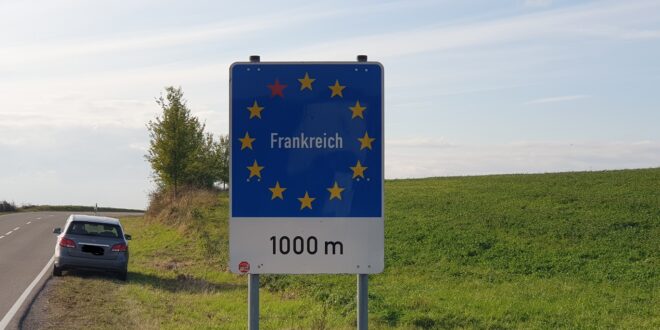Germany will introduce controls at its nine land borders for the next six months beginning from 16 September, Federal Interior Minister Nancy Faeser (SPD) announced in Berlin on Monday.
Accordingly, temporary border controls will be implemented at all of Germany’s land borders, including those with Austria, the Czech Republic, Poland, Switzerland, France, Luxembourg, the Netherlands, Belgium, and Denmark. Given that border controls have been in place at Austria’s border since May, at the frontiers with Switzerland, Poland, and the Czech Republic since June, and at the French border since July, Germany has effectively reverted to a period reminiscent of Europe’s border control era.
The expanded controls will apply from 16 September until 15 March.
Ms Faeser stated that these stricter measures are necessary to manage internal borders until the Common European Asylum System is fully operational and can secure the EU’s external borders.
Currently, foreigners are currently turned back at the border if they have no or false documents, have been banned from re-entering the country or do not have a visa or valid residence permit. Around 30,000 people have already been turned back since last October.
The new plan intends to go beyond the rejections that have been carried out to date, the interior minister said, but did not reveal to what extent and on what legal basis asylum-seekers would be affected. She plans to hold further discussions with the main opposition CDU/CSU and representatives of the Conference of Minister Presidents before making any public announcements. The CDU/CSU has made rejection of asylum-seekers at the borders a condition for continuing talks with the government.
The decision to extend border rejections follows a heated debate on asylum policy, partly triggered by the terrorist attack in Solingen and also the forthcoming state parliament election in Brandenburg, which opinion polls say the right-wing the Alternative for Germany (AfD) is set to win.
At the recent elections in Thuringia, the AfD made history by becoming the first far-right party to win a state election since World War II, with 33% of the vote. Similarly, in Saxony, the AfD also saw significant success, finishing a close second with 30.8%, just behind the Christian Democratic Union (CDU), which garnered 32%.
Migrant organizations, opposition left-wing politicians, and migration experts have criticized the government for pandering to far-right sentiments by adopting more restrictive policies. They argue that this approach could boost the AfD’s popularity by normalizing its anti-immigration agenda and making it more socially acceptable.
Media reports indicate also that residents of border regions are critical of the reintroduced border controls due to the inconvenience they will face, as many frequently travel across borders for work or daily activities, such as shopping.
It’s important to point out that Germany isn’t the only country to take this step. In fact, this year, 10 other nations within the open-border Schengen area reinstated border controls, citing reasons like combating terrorism and managing irregular immigration.
Femi Awoniyi
 THE AFRICAN COURIER. Reporting Africa and its Diaspora! The African Courier is an international magazine published in Germany to report on Africa and the Diaspora African experience. The first issue of the bimonthly magazine appeared on the newsstands on 15 February 1998. The African Courier is a communication forum for European-African political, economic and cultural exchanges, and a voice for Africa in Europe.
THE AFRICAN COURIER. Reporting Africa and its Diaspora! The African Courier is an international magazine published in Germany to report on Africa and the Diaspora African experience. The first issue of the bimonthly magazine appeared on the newsstands on 15 February 1998. The African Courier is a communication forum for European-African political, economic and cultural exchanges, and a voice for Africa in Europe.

































